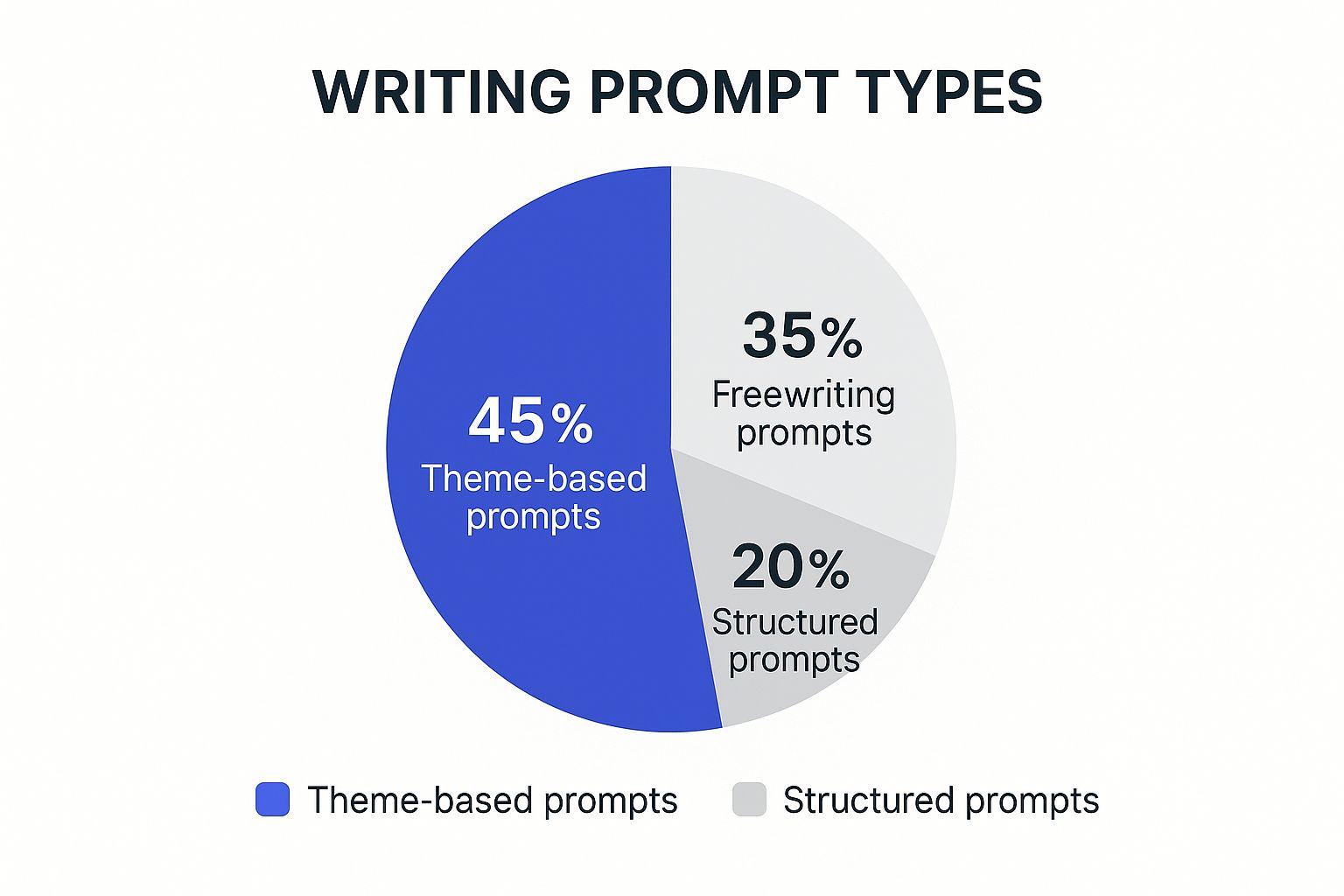Table of Contents
Finding Your Writing Practice Sweet Spot
Different Practice Approaches to Consider
Building a Sustainable Routine
Smart Tech Tools That Actually Help Your Writing
Choosing the Right Tools for Your Needs
Daily Writing Workouts That Actually Build Strength
Morning Pages and Freewriting Sprints
Prompt Responses and Targeted Exercises
Vocabulary Expansion and Style Exploration
Developing Your Voice Without Losing Technical Skills
Embracing Feedback and Breaking the Rules
Building Real Accountability That Actually Works
Finding Your Tribe and Mentors
Setting Realistic Goals and Measuring Progress
Embracing Feedback and Finding the Right Fit
Tailoring Practice for Your Specific Writing Goals
Adapting Your Practice as Your Goals Evolve
Recognizing When Your Routine Needs Adjustment
Your Personal Writing Practice Blueprint
Starting This Week: Practical First Steps
Finding Your Writing Practice Sweet Spot

So, you're looking to improve your writing? Forget the myth of endless drills. It’s not about forcing yourself into a rigid routine. It’s about discovering a rhythm that fits your life. I've connected with so many writers over the years, and the ones who truly thrive have one thing in common: consistency. They've found a sustainable practice, not a punishing one.
Forget the tortured artist trope. Real writing happens when you build a habit you can actually stick with. Most people abandon their writing goals not because they're lazy, but because they try to force a practice that doesn’t resonate with their personality.
Some writers love a strict schedule. Others need flexibility. My friend, for instance, swears by early morning writing sprints. Me? I prefer shorter bursts sprinkled throughout the day. The magic happens when you find what truly energizes you.
Different Practice Approaches to Consider
Here are a few ideas to get those writing wheels turning:
Morning Brain Dumps: Before the day's chaos sets in, jot down whatever’s on your mind. Don’t worry about perfect sentences – just get the words flowing. Think of it as a warm-up for your creative mind.
Weekly Challenges: Give yourself a target, like writing 500 words a day or finishing a short story. This creates structure and a real sense of accomplishment.
Targeted Exercises: Want to nail those opening lines or write sparkling dialogue? Focus on specific skills. It’s like cross-training for your writing.
Let’s debunk a common myth: you don’t need a perfect daily streak. Life happens. You'll miss days. It’s okay! Consistency over time is the real key, not a flawless attendance record. Developing solid writing skills is important for so many areas of life. It's kind of shocking, but the National Assessment of Educational Progress (NAEP) found that only 27% of US high school seniors were proficient writers in 2019. Regular practice truly makes a difference. Interested in diving deeper into these stats? Learn More about Statistics on Writing Proficiency.
Building a Sustainable Routine
Ready to make writing a habit? Start small. Don't try to change everything overnight. Weave writing into your existing schedule. Perhaps it’s 15 minutes during lunch or an hour before bed. Make it a regular part of your day, something you enjoy, not a chore.
One great way to build consistency? Start a blog! Check out our guide on how to start a blog for some practical tips. Remember, small, regular wins are more powerful than heroic bursts of effort. They build momentum and confidence. You’re in this for the long haul. Building a strong writing practice is a marathon, not a sprint. Find your sweet spot, and you’ll discover the joy of consistent progress.
Smart Tech Tools That Actually Help Your Writing

This infographic shows how writers use different types of prompts. Theme-based prompts take the lead at 45%, followed by freewriting at 35%, and structured prompts at 20%. It seems writers enjoy the open nature of theme-based prompts (like "explore the concept of loss") more than the stricter structure of something like "write a sonnet about a lost object." This tells us something interesting: writers often prefer exploring broader ideas when practicing, though a good chunk still appreciate structured exercises.
So, what about technology's role in all this? I know, some apps are more trouble than they're worth. But some can genuinely help your writing. Think of AI-powered writing assistants as that friend who gives you honest feedback. They're like a personal writing coach, pointing out things you might miss, from clunky sentences to an inconsistent tone. And then there are analytics platforms – these are like supercharged writing journals, tracking your progress over time and showing you how you're actually improving.
Choosing the Right Tools for Your Needs
Here’s the thing: no single tool works for everyone. Some tools are great for crafting poems, others for technical manuals. Some are grammar gurus, while others focus on your overall style. So, how do you pick the right one? It's all about your writing process.
Think about your preferences. Do you love the freedom of freewriting or the focus of structured prompts? Do you stumble over commas or struggle to get your point across clearly? Your answers will guide you.
For example, imagine you're writing a blog post and want to make sure it's SEO-friendly. Some platforms can analyze your keywords and suggest improvements. Super helpful if you’re trying to figure out how to tailor your writing for a specific audience. If that sounds up your alley, you might find this helpful: Content Creation for Beginners.
Let's talk about how these tools are shaping the future of writing. The International Writing Analytics Conference of 2025 really highlighted the impact of AI. They showcased how personalized feedback can make a huge difference in how quickly writers improve. Discover more insights here. This kind of personalized feedback used to require expensive coaching, but these tools are making it accessible to everyone.
To help you compare different approaches, I’ve put together this table:
Writing Practice Tools Comparison: A comprehensive comparison of traditional versus digital writing practice methods, including effectiveness, accessibility, and cost considerations.
| Method | Effectiveness | Time Investment | Cost | Best For |
|---|---|---|---|---|
| Traditional methods (journals, writing prompts) | Can be effective for developing foundational skills | Varies depending on the method | Low (primarily the cost of materials) | Writers who prefer a self-directed approach and enjoy reflection |
| Digital writing assistants (e.g., Grammarly, ProWritingAid) | Highly effective for identifying and correcting specific writing errors | Can be integrated into the writing process, minimizing extra time | Moderate (typically requires a subscription) | Writers who want immediate feedback and assistance with grammar and style |
| Writing analytics platforms | Effective for tracking progress and identifying areas for improvement | Minimal, as data is collected automatically | Moderate to high (depending on the platform and features) | Writers who are goal-oriented and want to measure their writing performance |
This table summarizes the key differences between traditional writing practices and the exciting new possibilities offered by digital tools. While traditional methods are great for building a foundation, digital tools provide targeted feedback and track your growth. Ultimately, the best method for you depends on your individual learning style and writing goals.
Daily Writing Workouts That Actually Build Strength

Think of writing practice like going to the gym. Just doing random exercises isn't going to magically make you stronger. Successful writers, like athletes, focus on training specific skills, like targeting certain muscle groups. So, how can you practice writing effectively? Let's explore some workouts that get real results.
Morning Pages and Freewriting Sprints
I like to start my day with stream-of-consciousness freewriting—what some people call "morning pages." Don’t censor yourself; just write whatever comes to mind. It's like a warm-up for your brain, helping to unlock creativity and clear out mental clutter. Even just 15 minutes can make a noticeable difference.
Another great technique is the timed writing sprint. Set a timer for, say, 25 minutes, and write continuously on one topic. This builds focus and trains you to articulate thoughts quickly. I’ve used this to power through writer’s block more times than I can count—it’s incredibly effective.
Prompt Responses and Targeted Exercises
Using writing prompts gives your practice more structure. Websites and books offer tons of prompts, everything from simple story starters to thought-provoking philosophical questions. Choose prompts that challenge your weaknesses. If dialogue is your nemesis, pick prompts that force you to write conversations.
This naturally leads to targeted exercises. Want to improve your descriptions? Spend a session describing a single object in intense detail. Having trouble with transitions? Practice smoothly connecting unrelated ideas. Think of these as focused workouts for specific writing muscles. A grammar checker can also be a helpful tool for refining your writing.
Vocabulary Expansion and Style Exploration
Expanding your vocabulary doesn't mean cramming lists of obscure words. Instead, pay attention to the language you encounter while reading. When a word or phrase catches your eye, write it down, look up its meaning and usage, and then try using it in your own writing. It sticks with you much better that way.
Experimenting with different writing styles can also stretch your creativity. Try writing a short story in the style of your favorite author, or draft a blog post in a completely different voice. This playful exploration helps you develop your unique writing style without feeling restricted. Need some inspiration? Checking out what topics to blog about can be a great starting point for exploring different writing styles.
To help structure your week, I've put together a sample schedule. Feel free to adjust it based on your own needs and preferences.
To get the most out of your writing practice, a structured plan is helpful. The table below provides a sample weekly schedule that you can adapt to your own needs. Remember, it’s a guide, not a rigid prescription!
| Day | Exercise Type | Focus Area | Duration | Skill Level |
|---|---|---|---|---|
| Monday | Morning Pages | Creative Flow, Ideas | 15 min | All Levels |
| Tuesday | Prompt Response | Dialogue | 30 min | Beginner |
| Wednesday | Targeted Exercise | Descriptive Writing | 45 min | Intermediate |
| Thursday | Freewriting Sprint | Clarity, Focus | 25 min | All Levels |
| Friday | Style Exploration | Voice, Tone | 1 hour | Advanced |
| Saturday | Prompt Response | Character Development | 30 min | Beginner |
| Sunday | Rest | Reflect, Read | - | All Levels |
This schedule combines different exercises to target various aspects of writing, from generating ideas to refining style. Remember, consistency is more important than intensity.
By mixing up these daily and weekly workouts, you’ll transform writing practice from a chore into a rewarding challenge. It’s a way to strengthen your writing muscles and build confidence. Remember, consistency is key. Short, regular sessions are much more effective than occasional bursts of intense effort.
Developing Your Voice Without Losing Technical Skills
Here's the thing: how do you make your writing sound like you while still making sure it's good? It’s a bit of a tightrope walk, honestly. You have to nail the technical stuff – grammar, sentence structure, all that – without squashing the personality that makes your writing unique. I've worked with so many writers who get so caught up in being "correct" that their work ends up sounding robotic.
Think of it like this: imagine learning a new language. You start with the basics, the rules, the vocabulary. But eventually, you want to move beyond textbook exercises and have real conversations. You want to express your thoughts and ideas. Writing is no different. The technical skills are essential, but they're just the starting point.
Finding Your Unique Style
So, how do you actually practice writing in a way that develops your voice? Experimentation is key. Try different approaches, different tones. Write a scene one way, then rewrite it completely differently. What feels more authentic? More you? This is how you begin to uncover your own unique style.
Another crucial element is strategic reading. Don't just passively consume books and articles. Pay attention to the writers you admire. What resonates with you about their work? How do they structure their sentences? How do they use language to create a specific mood or feeling? Analyze their work. It's like studying a master painter – you're not trying to copy them, but you are trying to understand their techniques.
Embracing Feedback and Breaking the Rules
Feedback is essential, but it can also be a double-edged sword. Trying to please everyone can dilute your voice. Find readers you trust – people who get what you’re trying to do. Listen to their input, but ultimately, trust your instincts. You’re the one telling the story.
And sometimes, you have to know when to break the rules. Think about jazz musicians. They have a deep understanding of music theory, which allows them to improvise and create something new and exciting. Writing is similar. Once you understand the why behind the rules, you can start to play with them. You can experiment with structure, with style, with voice, to create something truly unique. But remember, breaking the rules effectively only works after you understand why those rules exist in the first place. It's about making intentional choices, not being careless.
Building Real Accountability That Actually Works

Writing can feel isolating. Like you're pouring your heart onto the page, but it's just disappearing into the ether. You crave that connection, that feedback, that sense of actually moving forward. But so many accountability systems just don’t cut it. They're all about word counts, daily streaks, and impossible deadlines. It’s a recipe for burnout, not progress. So, how do you build accountability that actually fuels your writing? Let’s dive into what really makes a difference.
Finding Your Tribe and Mentors
Honestly, finding my writing tribe was a turning point. For so long, I'd been writing in a vacuum, constantly measuring myself against some imaginary ideal. Then, I joined a writing group. It was a game-changer. Suddenly, I had a community. People who get it—the joys, the frustrations, the whole rollercoaster of the writing life. We celebrate each other's wins, offer constructive critiques, and are there for each other when things get tough.
Having a mentor can be incredibly powerful too. I was lucky enough to connect with a more experienced writer who was willing to share their wisdom and help me navigate the sometimes-baffling world of publishing. Mentorship isn’t about someone dictating your path; it's about having a guide, someone who's been there, who can offer perspective and support.
Setting Realistic Goals and Measuring Progress
Let's face it: aiming to write a novel in a month is usually a recipe for disaster. Real accountability begins with realistic goals. Maybe it’s writing for 30 minutes a few times a week, or finishing one chapter this month. The point is to challenge yourself without setting yourself up to fail. It’s about steady progress, not unsustainable sprints.
How do you measure that progress? Word counts can be misleading. Some days I'll spend hours refining a single paragraph. Does that mean I’ve failed? Of course not. Focus on the qualitative improvements: Is your writing clearer? Your dialogue sharper? Is your story finding its shape? That’s where the real progress lies. Want to dive deeper into building a successful blog? Check out our guide on blogging and how to succeed with it.
Embracing Feedback and Finding the Right Fit
Feedback is vital, but it’s not a one-size-fits-all thing. When I first started, I joined a critique group that was very focused on technicalities. It was too much, too soon. I wasn't ready for that level of intense scrutiny. What I needed was encouragement, not a red pen bloodbath. Eventually, I found a group that understood where I was in my development, and the feedback I received was truly helpful.
Finding the right kind of feedback—and the right people to give it—is key to building confidence and staying motivated. It’s about building a support system that nurtures your growth, not one that makes you want to throw your laptop out the window.
Tailoring Practice for Your Specific Writing Goals
Not all writing practice is the same. Think about it – prepping for a big presentation is different than training for a marathon, right? The same goes for writing. How you practice should really depend on what you’re aiming for. Academic papers, short stories, emails, journal entries – they all demand different approaches.
Your practice needs to be as unique as your writing ambitions. It's about figuring out what works for you.
This image from Wikipedia shows King David writing. It's a reminder that writing, no matter the time period, takes real focus. Even centuries ago, it wasn't something people did casually. Our tools have evolved, but the need for concentration hasn't.
Adapting Your Practice as Your Goals Evolve
What happens when your writing focus changes? Let's face it, our interests shift. You might be all about short stories one day, blog posts the next, then suddenly, you’re drawn to poetry. Being able to move smoothly between different types of writing keeps your momentum going. It's like cross-training for your writing brain – the skills you pick up in one area often boost your abilities in others.
For example, I was surprised to find that adding creative writing exercises to my routine actually improved my academic writing. Things like working on vivid descriptions or crafting compelling narratives made my academic arguments more engaging.
Recognizing When Your Routine Needs Adjustment
So, how do you know when your writing practice needs a refresh? Maybe you've plateaued. Or maybe your writing feels a bit stale. Recognizing these signs is the first step. Don't be afraid to play around with new techniques, different writing prompts, or even just your writing environment.
Sometimes, a small change, like switching my writing time from morning to evening, makes a huge difference. Other times, I might need to join a writing group or get feedback from a friend. The key is to be adaptable. Just like you tweak your workout routine, your writing practice should change to meet your needs. By staying flexible, you'll be ready to handle anything your writing journey throws at you and make real progress.
Your Personal Writing Practice Blueprint
So, you're ready to build a writing practice that actually works? Fantastic! This isn't about rigid schedules and strict rules. It's about crafting a sustainable routine that fits your life and helps you reach your writing goals. Think of it as your personal writing practice blueprint.
Starting This Week: Practical First Steps
What can you do this week to get the ball rolling? Start small. I recommend scheduling 30 minutes, three times this week, just for writing. Don’t stress about perfect sentences. Just get words down. Seriously, that's the biggest hurdle.
Here are a few exercises I’ve found helpful:
- Freewriting: Set a timer and just write. Whatever comes to mind. It's amazing how this unlocks creativity and blasts through writer's block.
- Prompt Response: Find a writing prompt – tons of resources online and in books! – and use it as a springboard. This gives you some structure if freewriting feels too open-ended.
- Targeted Skill Practice: Want to get better at descriptions? Dialogue? Focus your practice session on honing that specific skill. It's like doing drills for your writing muscles.
These short bursts of focused writing build momentum. It's all about laying the groundwork for consistent growth. If you’re feeling a little lost on how to actually begin, learning from others’ experiences can be hugely valuable. Check out our guide on amateur blogging. Starting a blog is a fantastic way to put your practice into action and share your words with the world.
Milestones and Motivation: Tracking Your Progress
How do you know if you’re improving? Word count is one thing, but real improvement is about quality. Are your ideas clearer? Is your writing more engaging? More you?
Over the next few months, set some achievable milestones. Nothing crazy, just markers to track your progress.
- Finish a Short Story or Essay: Having a finished piece is incredibly motivating.
- Get Feedback: Share your work with trusted friends or join a writing group. Outside perspectives are invaluable.
- Experiment with Different Styles: Play around! Try writing a poem, a script, a blog post. You might surprise yourself.
Overcoming Obstacles: Troubleshooting Common Challenges
Motivation dips. It happens. Here’s how to handle those inevitable roadblocks:
- Missed a day? No big deal! Just pick it up tomorrow. It's about long-term consistency, not perfect streaks.
- Feeling Stuck? Switch things up. Try a new exercise, a different prompt, or even a different writing spot.
- Struggling with Feedback? Find readers who get your goals and offer constructive criticism. Supportive feedback is gold.
The most important thing? Consistent, focused practice will transform your writing. Trust the process, celebrate small victories, and enjoy the journey.
Ready to share your writing with the world? BlogMaker makes it easy to create and publish your own blog. From hosting and SEO to design and newsletters, BlogMaker handles the tech so you can focus on your writing. Explore BlogMaker today and unleash your storytelling potential!
SEO–ready, Analytics, No–code.
Your Content Publishing Engine
Deliver your SEO–driven content!
Visit BlogMaker.app



